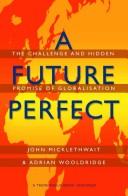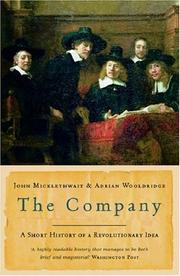| Listing 1 - 10 of 25 | << page >> |
Sort by
|

ISBN: 0521395151 0521026180 0511659997 Year: 1994 Publisher: Cambridge : Cambridge University Press,
Abstract | Keywords | Export | Availability | Bookmark
 Loading...
Loading...Choose an application
- Reference Manager
- EndNote
- RefWorks (Direct export to RefWorks)
The central claim of Measuring the Mind is that, contrary to popular opinion, the psychologists who dominated educational policy-making between the wars were educational progressives and political radicals. They argued that education should reflect the requirements of children rather than the convenience of adults, and regarded intelligence testing as an instrument of child-centred education. These psychologists owed their political inspiration to the meritocratic ideal and lost popularity with the waning of this ideal after the war. Four main themes dominate the discussion: the emergence of educational psychology as a distinct discipline; the recent history of ideas about children's mental development; the role of experts in formulating educational policy; and the rise and fall of the measurement of merit.
Educational psychology --- Onderwijspsychologie --- Psychologie de l'éducation --- Psychologie pédagogique --- Psychopedagogie --- Psychopedagogy --- Psychopédagogie --- Pédagogie expérimentale --- Educational tests and measurements --- -Educational psychology --- Education --- -Education --- -#PEDA *015.3 <420> --- #PEDA *1 <091> --- #PEDA *015.35 <420> --- #PEDA *1.014 <420> --- #PEDA *1.212 --- #PEDA *1.014.53 <420> --- #PEDA *P 025.61 --- Children --- Education, Primitive --- Education of children --- Human resource development --- Instruction --- Pedagogy --- Schooling --- Students --- Youth --- Civilization --- Learning and scholarship --- Mental discipline --- Schools --- Teaching --- Training --- Psychology, Educational --- Psychology --- Child psychology --- Educational assessment --- Educational measurements --- Mental tests --- Tests and measurements in education --- Psychological tests for children --- Psychometrics --- Examinations --- Psychological tests --- History --- Social aspects --- -History --- Political aspects --- Rating of --- Burt, Cyril Lodowic --- Educational psychology. --- History. --- #PEDA *015.3 <420> --- Political aspects&delete& --- Social aspects&delete& --- Burt, Cyril, --- England --- Educational tests and measurements - England - History. --- Education - Social aspects - England - History. --- Education - Political aspects - England - History. --- Social Sciences --- Political Science
Book
ISBN: 9780241391495 0241391490 Year: 2021 Publisher: Dublin Allen Lane
Abstract | Keywords | Export | Availability | Bookmark
 Loading...
Loading...Choose an application
- Reference Manager
- EndNote
- RefWorks (Direct export to RefWorks)
Meritocracy: the idea that people should be advanced according to their talents rather than their status at birth. For much of history this was a revolutionary thought, but by the end of the twentieth century it had become the world's ruling ideology. How did this happen, and why is meritocracy now under attack from both right and left?Adrian Wooldridge traces the history of meritocracy forged by the politicians and officials who introduced the revolutionary principle of open competition, the psychologists who devised methods for measuring natural mental abilities and the educationalists who built ladders of educational opportunity. He looks outside western cultures and shows what transformative effects it has had everywhere it has been adopted, especially once women were brought into the meritocractic system.Wooldridge also shows how meritocracy has now become corrupted and argues that the recent stalling of social mobility is the result of failure to complete the meritocratic revolution. Rather than abandoning meritocracy, he says, we should call for its renewal.
Mobilité sociale --- Civilisation --- Social stratification --- History of civilization
Book
ISBN: 9781510768611 Year: 2021 Publisher: New York (N.Y.) Skyhorse
Abstract | Keywords | Export | Availability | Bookmark
 Loading...
Loading...Choose an application
- Reference Manager
- EndNote
- RefWorks (Direct export to RefWorks)

ISBN: 074932645X 9780749326456 9780749326708 0749326700 Year: 1997 Publisher: London Mandarin
Abstract | Keywords | Export | Availability | Bookmark
 Loading...
Loading...Choose an application
- Reference Manager
- EndNote
- RefWorks (Direct export to RefWorks)
Organization theory --- Management. --- Deskundigen. --- Management --- Gestion --- Philosophy. --- Philosophie --- Management 658.012.4 --- leiding geven --- organisatieleer --- organisaties, verandering --- 65.012.4 --- Management. Directorate. Technique and methods of management --- 65.012.4 Management. Directorate. Technique and methods of management
Book
ISBN: 9781594202131 1594202133 Year: 2009 Publisher: New York Penguin press
Abstract | Keywords | Export | Availability | Bookmark
 Loading...
Loading...Choose an application
- Reference Manager
- EndNote
- RefWorks (Direct export to RefWorks)
On the street and in the corridors of power, religion is surging worldwide. From Russia to Turkey to India, nations that swore off faith in the last century--or even tried to stamp it out--are now run by avowedly religious leaders. This book examines this new world, from exorcisms in São Paulo to religious skirmishing in Nigeria, to televangelism in California and house churches in China. Since the Enlightenment, intellectuals have assumed that modernization would kill religion--and that religious America is an oddity. As these authors argue, religion and modernity can thrive together, and America is becoming the norm. The failure of communism and the rise of globalism helped spark the global revival, but, above all, 21st century religion is being fueled by a very American emphasis on competition and a customer-driven approach to salvation, and its destabilizing effects can already be seen far from Iraq or the World Trade Center.--From publisher description.
Sociology of religion --- United States --- BPB1106 --- États-Unis --- Religion --- Sociologie --- #SBIB:316.331H300 --- Verenigde Staten --- Godsdienst --- Godsdienst en samenleving: algemeen --- Religion and sociology --- Religion and sociology. --- Religion. --- Religion and society --- Religious sociology --- Society and religion --- Sociology, Religious --- Sociology and religion --- Sociology --- die Vereinigte Staaten --- Stáit Aontaithe Mheiriceá --- Združene države --- Ηνωμένες Πολιτείες --- l-Istati Uniti --- Ameerika Ühendriigid --- Stati Uniti --- Shtetet e Bashkuara --- Estados Unidos --- Stany Zjednoczone --- Spojené státy --- Egyesült Államok --- Statele Unite --- Amerikas Savienotās Valstis --- Förenta staterna --- Сједињене Америчке Државе --- Jungtinės Valstijos --- Yhdysvallat --- Съединени щати --- Sjedinjene Američke Države --- Spojené štáty --- Соединети Американски Држави --- Amerikas Forenede Stater --- САД --- VS --- USA --- EE.UU. --- JAV --- Amerikas förenta stater --- l-Istati Uniti tal-Amerika --- los Estados Unidos de América --- ΗΠΑ --- Shtetet e Bashkuara të Amerikës --- SAD --- Verenigde Staten van Amerika --- Соединетите Држави --- Amerikai Egyesült Államok --- Stati Uniti d'America --- Statele Unite ale Americii --- Ηνωμένες Πολιτείες της Αμερικής --- SHBA --- United States of America --- Ühendriigid --- Ηνωμένες Πολιτείες Αμερικής --- EUA --- ASV --- États-Unis d'Amérique --- Združene države Amerike --- Stany Zjednoczone Ameryki --- САЩ --- Съединени американски щати --- SUA --- Yhdysvallat, USA --- Spojené státy americké --- U.S.A. --- Jungtinės Amerikos Valstijos --- Sjedinjene Države --- Estados Unidos da América --- De Forenede Stater --- Spojené státy severoamerické --- Amerikan yhdysvallat --- Spojené štáty americké --- die Vereinigte Staaten von Amerika --- US --- fe --- uskonto --- náboženstvo --- vallás --- religión --- religioon --- godsdienst --- religie --- vjera --- religija --- religione --- reliģija --- religião --- náboženství --- religia --- религија --- reliġjon --- θρησκεία --- religion --- религия --- usutunnistus --- víra --- deismus --- светец --- теизам --- irreligiosità --- religiosità --- zbožnost --- věřící --- религиозност --- religiozita --- teismus --- деизам --- побожност --- světec --- kreacionismus --- panteismus --- Religionsgemeinschaft --- fideismus --- svatý --- vallási közösség --- Glaubensgemeinschaft --- pobožnost --- верници --- вера --- пантеизам --- sociología --- socjologia --- sosiologia --- sociologi --- κοινωνιολογία --- sotsioloogia --- soċjoloġija --- социологија --- социология --- sociologija --- szociológia --- sociológia --- socioloģija --- sociology --- sociologia --- sociologie --- sociologji --- Soziologie --- gender studies --- Entwicklungssoziologie --- sociobiologie --- sociológia politického života --- Na Stáit Aontaithe --- reiligiún --- socheolaíocht --- États-Unis

ISBN: 0434007536 Year: 2000 Publisher: London Heinemann
Abstract | Keywords | Export | Availability | Bookmark
 Loading...
Loading...Choose an application
- Reference Manager
- EndNote
- RefWorks (Direct export to RefWorks)
Book
ISBN: 9781846147333 Year: 2014 Publisher: London Lane
Abstract | Keywords | Export | Availability | Bookmark
 Loading...
Loading...Choose an application
- Reference Manager
- EndNote
- RefWorks (Direct export to RefWorks)
Book
ISBN: 9025422934 Year: 1997 Publisher: Amsterdam Contact
Abstract | Keywords | Export | Availability | Bookmark
 Loading...
Loading...Choose an application
- Reference Manager
- EndNote
- RefWorks (Direct export to RefWorks)

ISBN: 0753820404 Year: 2005 Publisher: London Phoenix
Abstract | Keywords | Export | Availability | Bookmark
 Loading...
Loading...Choose an application
- Reference Manager
- EndNote
- RefWorks (Direct export to RefWorks)
Book
ISBN: 9780735222441 0735222444 9780735222458 Year: 2018 Publisher: New York City Penguin Press
Abstract | Keywords | Export | Availability | Bookmark
 Loading...
Loading...Choose an application
- Reference Manager
- EndNote
- RefWorks (Direct export to RefWorks)
"From the legendary former Fed Chairman and the acclaimed Economist writer and historian, the full, epic story of America's evolution from a small patchwork of threadbare colonies to the most powerful engine of wealth and innovation the world has ever seen. From even the start of his fabled career, Alan Greenspan was duly famous for his deep understanding of even the most arcane corners of the American economy, and his restless curiosity to know even more. To the extent possible, he has made a science of understanding how the US economy works almost as a living organism--how it grows and changes, surges and stalls. He has made a particular study of the question of productivity growth, at the heart of which is the riddle of innovation. Where does innovation come from, and how does it spread through a society? And why do some eras see the fruits of innovation spread more democratically, and others, including our own, see the opposite? In Capitalism in America, Greenspan distills a lif etime of grappling with these questions into a thrilling and profound master reckoning with the decisive drivers of the US economy over the course of its history. In partnership with the celebrated Economist journalist and historian Adrian Wooldridge, he unfolds a tale involving vast landscapes, titanic figures, triumphant breakthroughs, enlightenment ideals as well as terrible moral failings. Every crucial debate is here--from the role of slavery in the antebellum Southern economy to the real impact of FDR's New Deal to America's violent mood swings in its openness to global trade and its impact. But to read Capitalism in America is above all to be stirred deeply by the extraordinary productive energies unleashed by millions of ordinary Americans that have driven this country to unprecedented heights of power and prosperity. At heart, the authors argue, America's genius has been its unique tolerance for the effects of creative destruction, the ceaseless churn of the old giving way to the new, driven by new people and new ideas. Often messy and painful, creative destruction has also lifted almost all Americans to standards of living unimaginable to even the wealthiest citizens of the world a few generations past. A sense of justice and human decency demands that those who bear the brunt of the pain of change be protected, but America has always accepted more pain for more gain, and its vaunted rise cannot otherwise be understood, or its challenges faced, without recognizing this legacy. For now, in our time, productivity growth has stalled again, stirring up the populist furies. There's no better moment to apply the lessons of history to the most pressing question we face, that of whether the United States will preserve its preeminence, or see its leadership pass to other, inevitably less democratic powers"-- "In Capitalism in America, Greenspan distills a lifetime of grappling with these questions into a thrilling and profound master reckoning with the decisive drivers of the US economy over the course of its history. In partnership with the celebrated Economist journalist and historian Adrian Wooldridge, he unfolds a tale involving vast landscapes, titanic figures, triumphant breakthroughs, enlightenment ideals as well as terrible moral failings. Every crucial debate is here--from the role of slavery in the antebellum Southern economy to the real impact of FDR's New Deal to America's violent mood swings in its openness to global trade and its impact. But to read Capitalism in America is above all to be stirred deeply by the extraordinary productive energies unleashed by millions of ordinary Americans that have driven this country to unprecedented heights of power and prosperity. At heart, the authors argue, America's genius has been its unique tolerance for the effects of creative destruction, the ceaseless churn of the old giving way to the new, driven by new people and new ideas. Often messy and painful, creative destruction has also lifted almost all Americans to standards of living unimaginable to even the wealthiest citizens of the world a few generations past. A sense of justice and human decency demands that those who bear the brunt of the pain of change be protected, but America has always accepted more pain for more gain, and its vaunted rise cannot otherwise be understood, or its challenges faced, without recognizing this legacy. For now, in our time, productivity growth has stalled again, stirring up the populist furies. There's no better moment to apply the lessons of history to the most pressing question we face"--
Capitalism --- Economic history --- History --- United States --- Economic conditions. --- Economic policy. --- Economic conditions --- History, Economic --- Economics --- 330.342.14 --- 338 (73) --- 338 (73) Economische situatie. Economische structuur van bepaalde landen en gebieden. Economische geografie. Economische produktie.economische produkten. Economische diensten--Verenigde Staten van Amerika. VSA. USA --- Economische situatie. Economische structuur van bepaalde landen en gebieden. Economische geografie. Economische produktie.economische produkten. Economische diensten--Verenigde Staten van Amerika. VSA. USA --- 330.342.14 Kapitalistische economie. Free enterprise. Markteconomie. Vrije concurrentie --- Kapitalistische economie. Free enterprise. Markteconomie. Vrije concurrentie --- Economic order --- United States of America
| Listing 1 - 10 of 25 | << page >> |
Sort by
|

 Search
Search Feedback
Feedback About
About Help
Help News
News